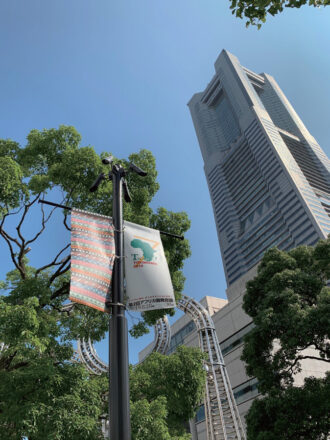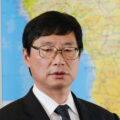From TICAD7 to the SDG Summit New York
The Seventh Tokyo International Conference on African Development (TICAD7) will be held in Yokohama from August 28 to 30. The conference outcomes will inform important decisions for the social and economic advancement of countries in Africa as well as for implementation of development agendas including the 2030 Agenda for Sustainable Development.

TICAD7 bunting on the Grand Mall in Minatomirai, Yokohama
First held in 1993, The Tokyo International Conference on African Development (TICAD) has become “a major global platform through which Asian and African nations, as well as international stakeholders, can collaborate to promote Africa’s development” (UN). The conference is co-organized by Japan, the United Nations, World Bank, UNDP and African Union Commission.
The theme of the upcoming, seventh TICAD is “Advancing Africa’s Development through People, Technology and Innovation.” The theme captures Japan’s commitment to leveraging its strengths in human resource development, science, technology and innovation, and boosting Africa’s development through “assistance that is unique to Japan” (MOFA).
At TICAD7, representatives of African countries, international organizations, development partners, private companies, civil society and others will gather to discuss the following main agenda items: (1) Economic transformation and improvements in the business environment and institutions through private investment and innovation, (2) Promotion of a resilient and sustainable society for human security and (3) Peace and stability, meaning support for Africa’s own proactive efforts. Discussions will be based on the needs of Africa and the outcomes of other international conferences such as the World Assembly for Women (WAW!), Women 20 (W20) and G20 Osaka Summit. In turn, TICAD7 delegates will hand over their conference outcomes to the SDG Summit to be held in New York from 24 to 25 September, 2019. The SDGs Promotion Headquarters of the Japanese government plans to revise its SDGs Implementation Guiding Principles based on the discussions and outcomes of TICAD7.
About TICAD
In the early 1990s, developed countries’ interest in and support for African countries began to fade, a result of so-called aid fatigue. Japan, however, continued to argue the importance of African development from the standpoint of a country which had provided assistance to African countries since its own return to international society after World War II in the mid 1950s. Japan organized the first TICAD in 1993 with the goal of refocusing international attention on the importance and urgency of African development issues.
TICAD is a multilateral forum for African countries and international organizations, development partner countries, private companies and civil society organizations involved in African development. The forum has advocated the importance of supporting African “ownership” and promoting international “partnerships” to realize its goals. Japan has established follow-up mechanisms to fulfill promises made in the forum. Pledges are announced at the summit-level meetings, and the status of their implementation is monitored and confirmed at TICAD ministerial meetings. African countries have highly acclaimed the steady assistance extended by Japan.
In this way, since the launch of TICAD, Japan has deepened relations with Africa and contributed to the continent’s remarkable economic growth in recent times by leading the international community’s efforts on African development. That is the so-called TICAD process.
The TICAD Process
At the first TICAD in 1993, discussion was made on themes such as political and economic reforms (good governance), economic development through activities of the private sector, promotion of regional cooperation and integration, and Asian experience and African development. The “Tokyo Declaration on African Development — Towards The 21st Century” was adopted at the end of the conference.
The main themes for TICAD II (1998) were reduction of poverty and improvement of quality of life, African ownership, and partnership between African and other countries. The outcomes were adopted in “African Development Towards the 21st Century: the Tokyo Agenda for Action.”
At TICAD III (2003) discussions focused on support for the African Union’s New Partnership for Africa’s Development (NEPAD), the consolidation of peace, capacity building, human-centered development, infrastructure, agricultural development, private sector development, expansion of partnerships and dialogue with civil society.
TICAD IV (2008) focused on the theme of boosting economic growth, ensuring human security, addressing environmental issues and climate change, and broadening partnerships. The outcomes of TICAD IV were adopted in the “Yokohama Declaration.”
At TICAD V (2013), Prime Minister Abe Shinzo announced “The ABE Initiative: The Africa Business Education Initiative for the youth.” In his speech at the Opening Session, Prime Minister Abe said, “We will offer undergraduate and graduate education to young people from Africa who come to study in Japan, and in addition we will simultaneously provide opportunities to work as interns at Japanese companies. This will be at a scale of 1,000 students over five years.” Abe further promised to set about cultivating “business and industry savvy human capacities” that will lead to employment for 30,000 individuals, making use of the human resources development already being implemented by JICA and by HIDA — The Overseas Human Resources and Industry Development Association — while also utilizing the Japanese Government Scholarship program. At the conference, delegates discussed the issues of supporting Africa’s own efforts, mainstreaming women, increasing opportunities for youth and promoting human security. The outcomes were adopted in the “Yokohama Declaration 2013.”
In 2016, TICAD VI was held in Africa for the first time and the “TICAD VI Nairobi Declaration” was adopted, stating a commitment to continue implementing measures under the Yokohama Action Plan 2013–2017 under three pillars: (1) Promoting structural economic transformation through economic diversification and industrialization, (2) Promoting resilient health systems for quality of life and (3) Promoting social stability for shared prosperity. TICAD had been held every five years since 1993 but the term has changed to every three years since the sixth meeting. Over 11,000 people participated in TICAD VI including about 3,000 from Japan. For the first time, a strong emphasis was placed in discussions on the importance of the private sector for African development.
The Driving Force for Development
“To involve the private sector, especially corporations, in committing even more deeply to be a driving force for African development, urgent steps must be taken to evolve the TICAD process as a whole with the aim of making a ‘model change.’”
This statement appears in “Recommendations: Presenting a New Vision for Japan-Africa Relations at TICAD7: Enabling Greater Private-sector Contributions to Sustainable Growth in Africa,” a proposal by the Keizai Doyukai (Japan Association of Corporate Executives), announced in September 2018. The two main recommendations are (1) Incorporate a mechanism for official private-sector dialogue into the TICAD process and (2) Pursue public-private partnerships to encourage private-sector companies. The Association states:
In 2013 the member states of the African Union unanimously adopted “Agenda 2063” and, having identified industrial promotion and job creation in their own countries as their highest priorities, they have taken up the challenge of developing and transforming Africa. Accordingly, the attention of African countries has shifted from aid to trade and investment, and expectations toward the private sector, especially business expansion by companies, are on the rise. At the same time, Western countries, China and ASEAN countries and other emerging nations have expressed the desire to make inroads into Africa.
The Association identifies the limitations of support for Africa’s sustainable development through public-private collaboration alone, stating:
The Japanese government needs to encourage the governments of African countries to offer incentives to private-sector companies dealing with issues of basic education and other local human resource development issues. It should resolutely urge these countries, by utilizing all available bilateral and multilateral frameworks, to address governance issues such as regulatory/systemic changes connected to industrial policy and economic activities and underdeveloped administrative capabilities.
In a speech at the opening session of TICAD VI in Kenya, on August 27, 2016, Prime Minister Abe spoke of the ever closer ties now developing between Asia and Africa: “The supply chain is already building something quite like an enormous bridge between Asia and Africa, providing industrial wisdom. […] Asia has enjoyed growth on the basis of the democracy, rule of law, and market economy that has taken root there. It is my wish that the self-confidence and sense of responsibility spawned there as a result come to envelop the entirety of Africa together with the gentle winds that blow here.”
Note: For more information about TICAD7 including the side events to be held involving international organizations, private companies, NGOs and so on, please visit the official website at www.mofa.go.jp/region/africa/ticad/ticad7/index.html
Reprint from “International Cooperation: From TICAD7 to the SDG Summit New York,” The Japan Journal, July/August 2019 (Vol. 16 No. 2), pp. 24-25. [August 2019]




